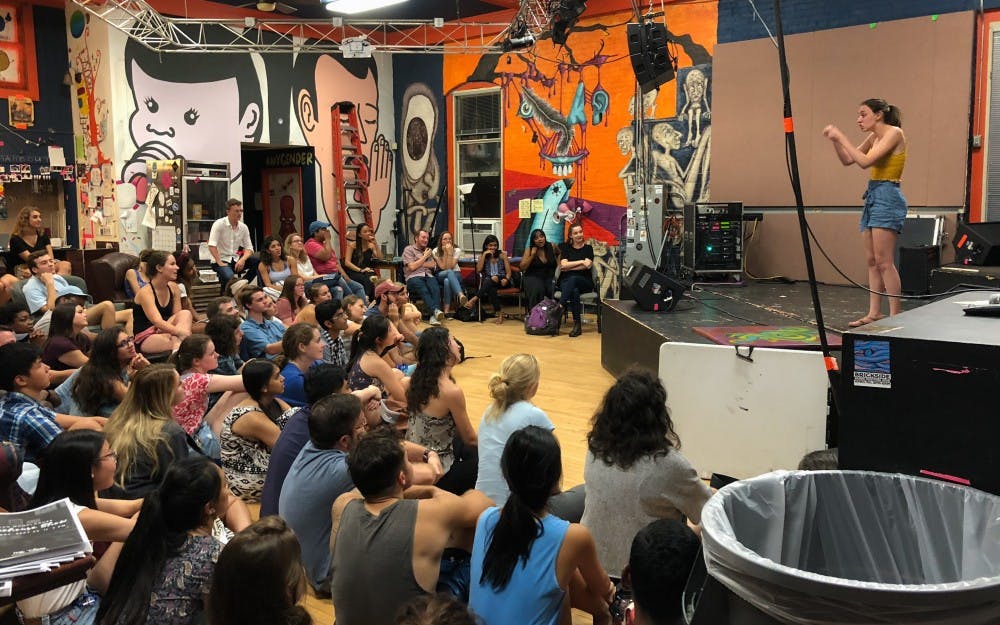In the past year, the #MeToo movement has gone viral, creating a platform for people to voice their experiences of sexual harassment and assault. When people discuss the Me Too Monologues on Duke’s campus, they often associate the movement and the monologues as nearly identical entities.
Although Me Too Monologues occasionally showcases the voices of those affected by sexual assault and harassment, it is sometimes misconstrued as a space for those individuals who are personally affected by the movement. But Me Too Monologues goes far beyond the realm of the #MeToo movement; the group seeks to encapsulate all aspects of people’s identities through these monologues.
“When people think of Me Too monologues, they sometimes shut down… they feel like it’s not their space," said senior Vivian Luo, co-director of Me Too Monologues. "But it is. It’s open to all."
Entirely written, directed, and performed by Duke students, Me Too Monologues aims to create an intimate space that encourages vulnerability and cultivates empathy. Students anonymously submit monologues that explore different parts of their identity; monologues are then chosen and actors are cast to perform the words of the author.
“The things that separate us in everyday Duke culture, they don’t disappear, but for a brief moment you forget they exist,” said Luo.
At Duke, Me Too Monologues offers a place to talk about things beyond the prominent and superficial culture of “effortless perfection.”
“Me Too Monologues was the first time I had seen such vulnerability on Duke’s Campus – the first time I was apart of a community that encouraged so much intimacy and empathy for themselves and for others,” said senior and executive producer Annie Delmedico.
Even if a person does not directly relate to the content of a monologue, often they are able to empathize and relate their own experiences to those voiced in the monologues.
The showcases are intended to build solidarity between peers and act as more than a performance: Each show is intended to be an interactive conversation between the actors and the audience. In the eyes of the directors, the willingness to sit in that space and participate speaks volumes about the intimacy and human connection that people crave on Duke’s campus, even if they rarely speak openly about it.
“There’s no quantitative measure of what we’re doing on campus," said Delmedico. "We make this whole show and we put it out there and we trust that it does something for someone somewhere."
Although the organizers would like the monologues showcased to be representative of student submissions and experiences, they understand that is impossible to encapsulate every marginalized voice on campus into a single show. Picking which monologues are chosen is an incredibly difficult task.
“Everybody’s voices are valid," said Luo. "If we don’t take a piece, we don’t want people to think we didn’t want their voices heard. We’re just trying to present a snapshot of what people are feeling."
The creators do intend to bring marginalized voices to the forefront, though they emphasize that their goal is not to fix problems, but to initiate conversation on issues of importance to the students.
“[Me Too] is just trying to amplify voices that wouldn’t otherwise be heard,” Delmedico said. “We’re the vessel for the stories people trusted us with.”
Through creating an environment where people are able to be vulnerable, the directors hope that Me Too monologues can be a place of healing as well as an exercise in empathy. Especially for the authors, they hope writing these monologues will allow individuals to be honest with themselves and aid in the healing process, even if the monologues are never submitted or spoken out loud.
“We’re not trying to put words into people’s mouths or tell you how to think about an issue," said Luo. "We’re just a medium to connect the experience of one individual student with a larger audience."
Although it is hard to know the tangible impact of the monologues on students and Duke’s campus, Luo had one particular moment stick out for her. After performing her first monologue her freshman year, the author came up to speak to her immediately following the show.
“She told me that writing the monologue for herself was such a large part in her healing process,” said Luo.
These moments of personal intimacy can be difficult to find on college campuses, and the creators of Me Too hope that these shows can promote solidarity and establish an unspoken bond between students.
“The phrase ‘Me too’ is just such a transcendent phrase," said Delmedico. "We really want it to be a communal experience."
Interested in getting involved with Me Too? Monologue submissions for the spring 2019 show are due Sunday, Sept. 30. Auditions for the spring 2019 show will be in October. Submit here.
Get The Chronicle straight to your inbox
Signup for our weekly newsletter. Cancel at any time.

